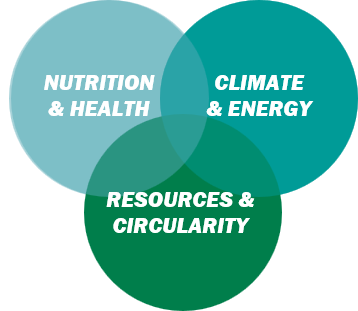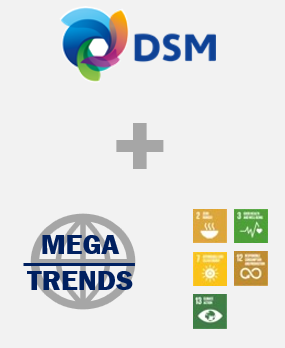Companies are proving business growth alongside increased value for stakeholders
Tell us about the work you do at DSM as Vice-President for Sustainability.
My key responsibilities consist of shaping and embedding DSM’s purpose-driven agenda, by providing over-all strategic leadership, integration and management of sustainability across the organization, and stakeholder engagement both externally and internally.
DSM’s sustainability approach is embedded in the company’s strategy. What does this mean? How does DSM implement sustainable and inclusive business initiatives?
In June 2018, Royal DSM announced its new strategy: Growth & Value – Purpose led, Performance driven. We made a decisive next step as a purpose-led company, contributing to a brighter world for all with our science-based solutions. Sustainability is firmly embedded in our broader approach and our purpose, creating brighter lives for all, guides all the decisions we make as a company.
We work on creating value in Nutrition & Health, Climate & Energy, and Resources & Circularity. These domains are derived from the megatrends, Sustainable Development Goals (SDGs) and the key competences we have as a company.


We make change happen through three key actions:
- Improve and adapt our own operational impact by further improving safety, decreasing our emissions and stepping up our use of renewable energy
- Enable our customers and partners to deliver sustainable and healthy solutions for the planet and society
- Advocate for the future we believe in and fully accept our responsibilities as an active part of society
DSM aims to achieve social advances to create sustainable value for all stakeholders. How do you do this in practice?
Our scientific expertise and innovative power are helping us answer some of the world’s biggest challenges—supporting our business growth and providing value to all our stakeholders: customers, employees, shareholders and society at large.
As a specific example of our inclusive business activities, DSM works closely with private sector partners to develop more nutritious products, adapted in terms of content (nutrient-dense foods), price and accessibility to have a large positive impact on public health, in a financially sustainable way.
How do you create value for customers and shareholders? Do you have any advice for how inclusive business entrepreneurs can differentiate their companies and build trust with their customers?
It is important to be aware of your business’ contribution to societal objectives, so think beyond just what you do and also take into consideration why you do it. This will help to identify new opportunities for collaboration with partners who share your belief. An example of how we are putting this into practice at DSM is through our involvement in Africa Improved Foods (AIF). AIF is a public-private partnership involving DSM, the Government of Rwanda, International Finance Corporation, CDC Group and FMO. AIF provides a scalable and sustainable solution to malnutrition via local production of highly nutritious foods. Sixty-five million dollars has been invested in Rwanda already in best-in-class technology, operational since December 2016. AIF is a social enterprise and embedded in its business model is a comprehensive strategy to reduce poverty, create jobs and address stunting and malnutrition through partnerships with nonprofit institutions, such as WFP & governments, as well as making affordable commercial products for the mass market.
How do you create social impact? For example, do you integrate low-income people into your value chain?
Going back to our purpose, creating brighter lives for all means that we consciously develop solutions to reach all sectors of society. AIF sources from 14,000 local smallholder farmers, many of whom are women. By providing a guaranteed market for their produce, they can make investments and provide a more stable income for their families.
We aim to create social impact through all our activities. We set up the Brighter Living Solutions programme which drives products and innovations that have specific environmental or social benefits compared to mainstream reference solutions. More than 60% of DSM’s business portfolio has reached this goal so far, and in our innovation pipeline we are close to 90%. The benefit can be identified in one or more stages of the product life cycle: from raw materials through the manufacturing process and use phase to potential re-use and end-of-life disposal. Products qualify as Brighter Living Solutions based on comparative Eco or People Life Cycle Assessments (LCA) or expert opinions in cooperation with LCA experts.
We indeed integrate low-income people into our value chain. As one of the world’s leading manufacturers of vitamins, nutritional ingredients and food fortification technologies, we are well placed to develop and deliver better nutrition for the people deficient in these. Our Nutritional Improvement team provides a range of nutrient-rich foods—from micronutrient powders to fortified rice—while working with humanitarian organizations, food companies and social enterprises to reach the wider population.
Another example is our partnership with the World Food Programme, which in 2018 has helped deliver better, more nutritious food to more than 38 million beneficiaries around the world. In parallel, our work with UNICEF, and the humanitarian nutrition think tank, Sight and Life, is delivering healthier food to an estimated 400,000 children, starting with a micronutrient powder pilot program in Nigeria.
How do you convince people within the company, but also external stakeholders, of your approach? How do you make a pitch for sustainable and inclusive business?
We believe that a strong society is more than just a strong economy. Making money is a means to an end, not an objective in itself. The objective must be a healthy, functioning society for all. We see more and more companies, like DSM, proving that doing well financially can go together with doing well for the world. And this will only become more important. Within the next ten years, good financial results will have to go hand in hand with purpose, otherwise companies will lose their license to operate. We take very clear and proactive advocacy positions, within the business community and also with governments and regulators on topics such as nutrition improvement, climate change and resources and circularity. Senior executives invest significant time in leadership roles in these domains.
Internally, we have governance and incentive structures linked to delivering on sustainable and inclusive business, including a Supervisory Board standing committee on sustainability as well as a separate external sustainability advisory board.
From your experience, what is essential when it comes to “making a pitch” for inclusive business and why?
Like all business, inclusive business needs to address both societal issues and deliver good financial returns. So, a sound business case with tangible proof points of how this will be realised, will be key to create a receptive audience for inclusive business.
Is there anything you would still like to add?
A healthy society is an inclusive society. Business is an integral part of society, so it follows that business must be inclusive to truly be part of a healthy society.